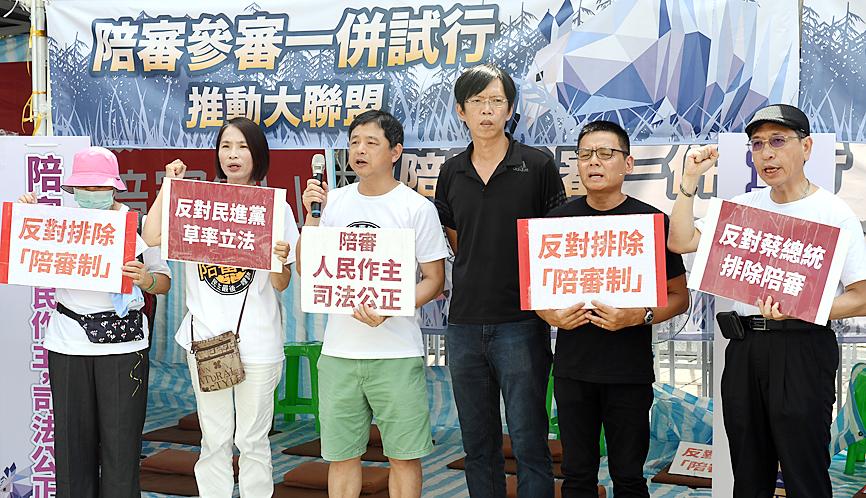Members of the Judicial Reform Foundation and the Taiwan Jury Association yesterday were joined by supporters for a sit-in at the Legislative Yuan in Taipei to demand that legislators include a proposed jury system on the legislative agenda.
Yesterday was the sixth day of the sit-in, and foundation chairman Lin Yung-sung (林永頌) said they were disappointed with the results of cross-caucus negotiations during Friday’s extraordinary legislative session, as a proposal for a jury system, which he said the majority of the public wants, was still not included on the agenda.
Democratic Progressive Party legislators are backing the Judicial Yuan’s proposal for a lay judge system.

Photo: CNA
“There are lawmakers who said that a jury system does not produce a ruling and therefore defendants cannot launch an appeal. This is a distortion, and it shows that most legislators do not understand how a jury system works,” Lin said.
Appeals would not be a problem, as a presiding judge could review the points of a jury’s ruling, and prosecutors could mount an appeal based on that, he said.
Association founder and attorney Jerry Cheng (鄭文龍) said that a jury system is the best way to deliver justice for the people, it is the most open and democratic way for a judicial system to operate, and it has been in use in many countries for more than a century.
“If Taiwan uses a jury system, judges cannot operate in the dark to decide on cases based on their own free will and their biased personal opinion. It would curtail corruption, which is rampant in Taiwan’s justice system, where judges have been convicted for taking bribes, and it would also evade interference from wealthy individuals and powerful politicians,” Cheng said.
He said that in the US, judges give jurors courtesy and respect, and treat them as equals, as should be expected in a democratic society.
However, in Taiwan, judges act with arrogance and hold elitist views, and usually view common people with contempt, which is why the conservative forces in the judicial system and Judicial Yuan are opposed to a jury system, as they want to preserve their privileges and the power to rule over people’s lives, Cheng said.
At the rally, several people who have been wrongly convicted spoke about their own ordeals with the judicial system and urged for real judicial reform with a jury system.
Presidential Office spokesman Xavier Chang (張惇涵) yesterday said that “the government’s push for a ‘national judge act’ should not have been seen as an issue of contention between supporting a jury system or a lay judge system. It should be focused on letting people participate in the prosecution of criminal trials.”
“In the proposed ‘national judge act,’ the judiciary can provide room for the public to participate in criminal prosecution, while utilizing the professional expertise of judges. This would give more openness and transparency to judicial prosecution, and make case rulings fairer for justice to prevail,” he said, adding that the office looks forward to sensible deliberation by all political parties on the issue.
Additional reporting by Lee Hsin-fang

US President Donald Trump said "it’s up to" Chinese President Xi Jinping (習近平) what China does on Taiwan, but that he would be "very unhappy" with a change in the "status quo," the New York Times said in an interview published yesterday. Xi "considers it to be a part of China, and that’s up to him what he’s going to be doing," Trump told the newspaper on Wednesday. "But I’ve expressed to him that I would be very unhappy if he did that, and I don’t think he’ll do that," he added. "I hope he doesn’t do that." Trump made the comments in

NOT AN OPENING: Trump’s violation of international law does not affect China’s consideration in attacking Taiwan; Beijing lacks capability, not precedent, an official said Taiwanese officials see the US’ capture of the president of Venezuela as a powerful deterrent to Beijing’s aggression and a timely reminder of the US’ ability to defeat militaries equipped with Chinese-made weapons. The strikes that toppled Venezuelan President Nicolas Maduro signaled to authoritarian leaders, including Chinese President Xi Jinping (習近平), US President Donald Trump’s willingness to use military might for international affairs core to US interests, one senior official in Taipei’s security circle said. That reassured Taiwan, the person said. Taipei has also dismissed the idea that Trump’s apparent violation of international law could embolden Beijing, said the official, who was not

A cold surge advisory was today issued for 18 cities and counties across Taiwan, with temperatures of below 10°C forecast during the day and into tonight, the Central Weather Administration (CWA) said. New Taipei City, Taipei, Taoyuan and Hsinchu, Miaoli and Yilan counties are expected to experience sustained temperatures of 10°C or lower, the CWA said. Temperatures are likely to temporarily drop below 10°C in most other areas, except Taitung, Pingtung, Penghu and Lienchiang (Matsu) counties, CWA data showed. The cold weather is being caused by a strong continental cold air mass, combined with radiative cooling, a process in which heat escapes from

Snow this morning fell on Alishan for the first time in seven years, as a strong continental cold air mass sent temperatures plunging across Taiwan, the Central Weather Administration (CWA) said. The Alishan weather station, located at an elevation of about 2,200m in central Taiwan, recorded snowfall from 8:55am to 9:15am, when the temperature dropped to about 1°C, the CWA said. With increased moisture and low temperatures in the high-altitude Alishan area, the conditions were favorable for snow, CWA forecaster Tsai Yi-chi (蔡伊其) said. The last time snow fell at the Alishan weather station was on Jan. 10, 2018, while graupel fell there